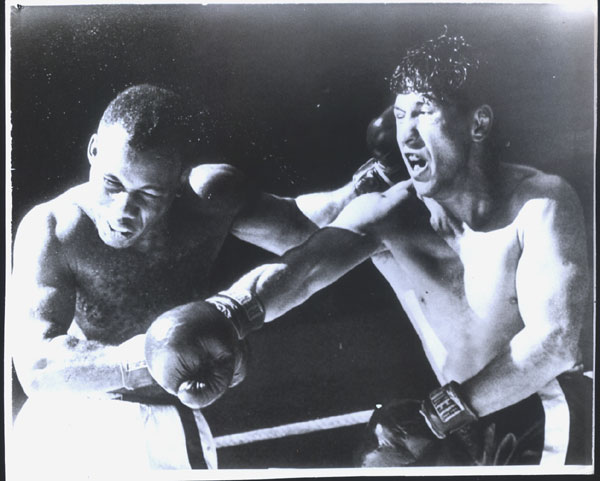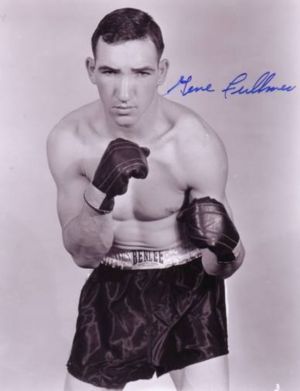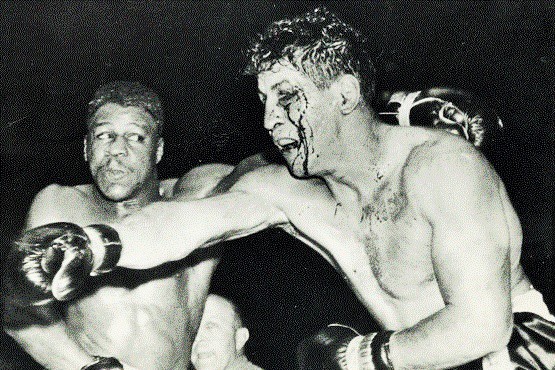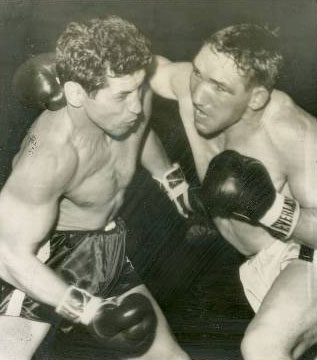As most boxing fans know, they made a movie about wrongly imprisoned middleweight contender Rubin “Hurricane” Carter with Denzel Washington in the leading role. And while no doubt that story deserved the big-time Hollywood film treatment, in the process its makers inflicted an injustice on a man who had already suffered his share. More to the point, if the Carter story made for great film fare, so would the tale of one Carmine Orlando Tilelli, aka Joey Giardello. Come on, Hollywood; it’s overdue.
Giardello defeated Carter in his one and only successful defense of the world title in 1964, the victory coming after big wins over Sugar Ray Robinson and Dick Tiger. By this time Joey was well past his prime, but he had more than enough skill and moxy to tame the fearsome power of the “The Hurricane.” But in the movie, the match is portrayed as a blatant robbery, with Joey the beneficiary of racially-motivated chicanery.
The real-life Giardello would successfully sue the makers of the film, but he couldn’t sue anyone after suffering his own misfortunes during his arduous boxing career, one with more highs and lows than a Coney Island roller-coaster. The fight game is full of sad stories and hard-luck pugs, but there’s something particularly poignant about the Joey Giardello tale, because the undeniable fact is that this prolific and talented gladiator has really never received his just due. No wonder he lawyered up after the “Hurricane” movie came out; it must have been like salt in a festering wound.

Space does not allow for a re-telling here of the entire Giardello story, but much of it boils down to one simple fact: he was too good for his own good. Because when he was at his peak, Joey was tearing up the middleweight division, besting the likes of such top talents as Joe Miceli, Billy Graham, Joey Giambra, Gil Turner, Ralph “Tiger” Jones and Rocky Castellani, among others. But try as he might he just could not get a title shot.
His best years were arguably 1953 to ’56, which included a 20-3 stretch that saw him beat Jones, Turner and Graham while being robbed in a decision loss to Johnny Saxton. Had he gotten a chance against Carl “Bobo” Olson or Robinson during that time, who knows what might have transpired, but Giardello had himself to blame when a title match with “Bobo” was scuttled by a car accident. Joey was behind the wheel and his knee got banged up and it was goodbye title shot.

Next, it was five months behind bars for Joey after a bizarre incident at a gas station when he and some buddies took offense to something the attendant said and went on a rampage. Joey insisted he had stayed in the car, didn’t lay a hand on anyone or anything, but the law didn’t see it that way and it was another setback for a contender who was gaining a reputation for being too much trouble than he was worth.
But the jail stint forced Giradello to, in his own words, “grow up.” While in prison his father died and the shame and remorse Joey felt only made him more determined and focused, though redemption didn’t come easy in this highly competitive era and with a middleweight division full to bursting with top-notch talent. Once back in the ring there were big wins over “Tiger” Jones and Rory Calhoun, but there were also defeats to Charley Cotton, Spider Webb and Joey Giambra.

But, after splitting two close matches with Dick Tiger, Giardello at long last got his shot at the big prize. Gene Fullmer elected to defend his world title against Joey, or at least that part of it held by “The Utah Cyclone.” The championship had been fractured after Sugar Ray Robinson took a twenty month layoff and was stripped of the belt by the National Boxing Association. Fullmer, who had split two matches with Sugar Ray, was on an eleven fight win streak which included a tough battle with Carmen Basilio for the vacant NBA crown and a defense of it against Spider Webb in Fullmer’s home state of Utah. After that points win, which was not without controversy, Webb was asked if he would ever agree to face Fullmer again. “Sure,” he replied, “but anyplace outside of Utah.”

Fullmer vs Giardello wasn’t in Utah, but Montana might as well have been “The Beehive State” for all the support Giardello was likely to get two thousand miles away from his home turf of Flatbush in Brooklyn. But by the end of fifteen punishing rounds, the sell-out crowd was cheering both fighters, Joey winning over more than a few with his courage and willingness to battle on Fullmer’s terms: toe-to-toe, with more than a little extra rough stuff, the kind “The Mormon Mauler” specialized in.

In fact, one of the highlights of this savage, back-and-forth brawl was Fullmer’s insistence on impersonating a billy-goat, as he repeatedly charged his challenger skull-first. And in addition to head butts, Gene was also generous in doling out the elbows and rabbit punches. In round four an incensed Giardello, who was already cut over the right eye, and had complained more than once to referee Harry Kessler regarding the foul tactics, lowered his head and blatantly cracked Fullmer one beauty of a head-smash. When Kessler intervened to admonish the challenger, Joey actually pushed him in frustration while waving at Fullmer as if to say, “If that’s how you want to fight, fine by me!”

Kessler struggled to maintain control and for the remaining rounds it was a brutally violent scrap, Fullmer constantly attacking and throwing heavy shots to the body, while Giardello countered with sharp hooks and uppercuts, his stubborn refusal to cave in winning over the crowd. Some thought Joey was doing the sharper, cleaner work, while others preferred Fullmer’s constant aggression. It was not an easy match to score and ringside cards were all over the place. The only thing people could agree on was that it was close. UPI gave it to the champion by two points, while the Associated Press saw it a draw. One judge tabbed Giardello the winner, another scored it for Fullmer, and the third saw it even; with the split draw Fullmer kept his title.

It would take another three years, sixteen fights and a fifteen round war with Robinson before Joey finally got a second chance at the world title and this time he made good, winning a clearcut decision over Tiger in their third meeting. Then came the big win over Carter in Philadelphia, a case of experience outfoxing youth. But the bitterness over the Fullmer fight remained. As late as 2005, Joey told Rolando Vitale, author of The Real Rockys, that he “felt very bad about it.”
“I knew I won the fight. I beat him [but] they gave him a draw. I believe I won at least nine rounds. He kept coming in with his head, elbows and shoulders. I complained to the referee to step in but he didn’t. After Fullmer butted me many times I lost my cool and butted him back. I stood up to the bully. It wasn’t a pretty fight but I believe I won at least nine rounds.” — Michael Carbert











